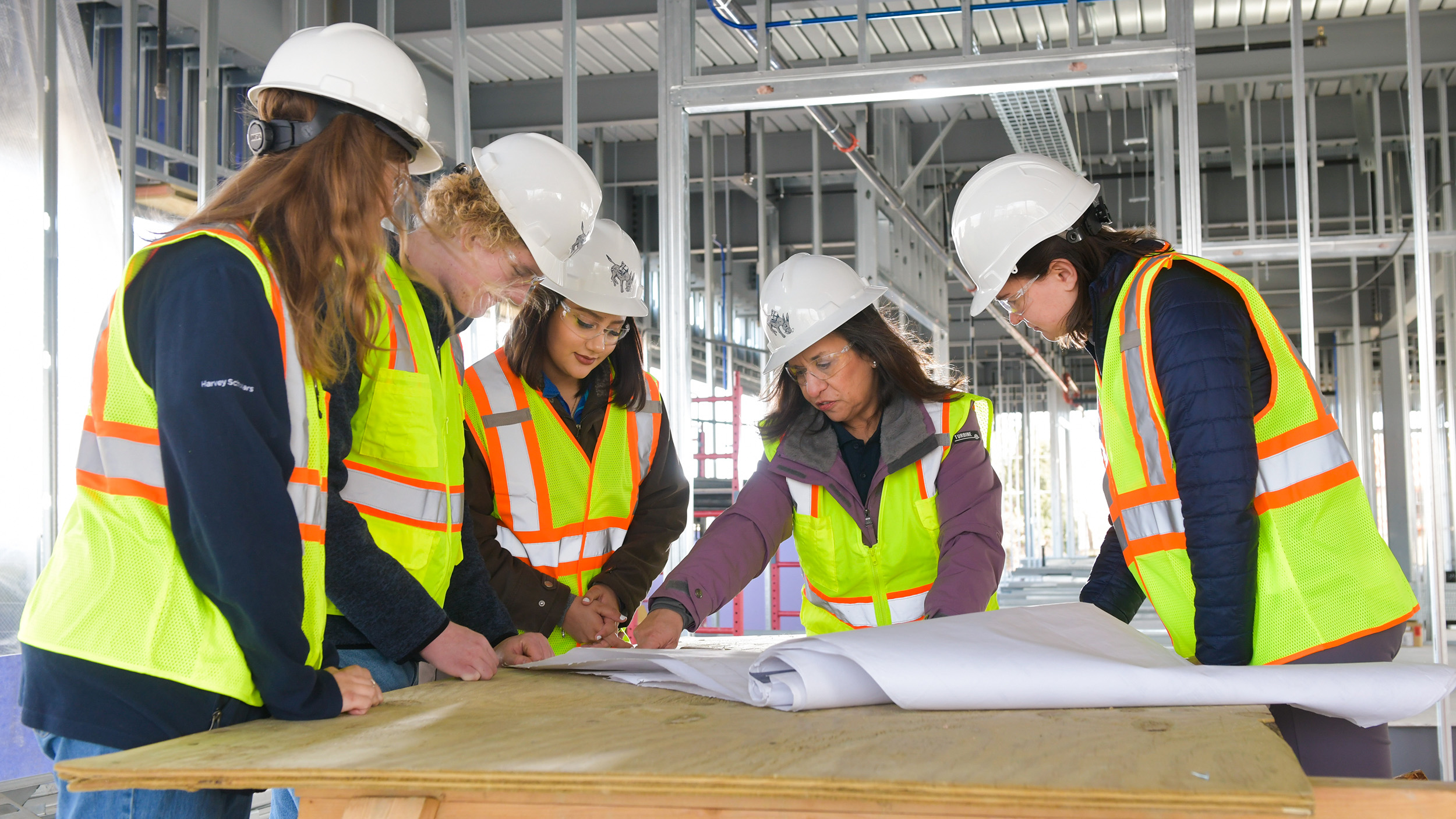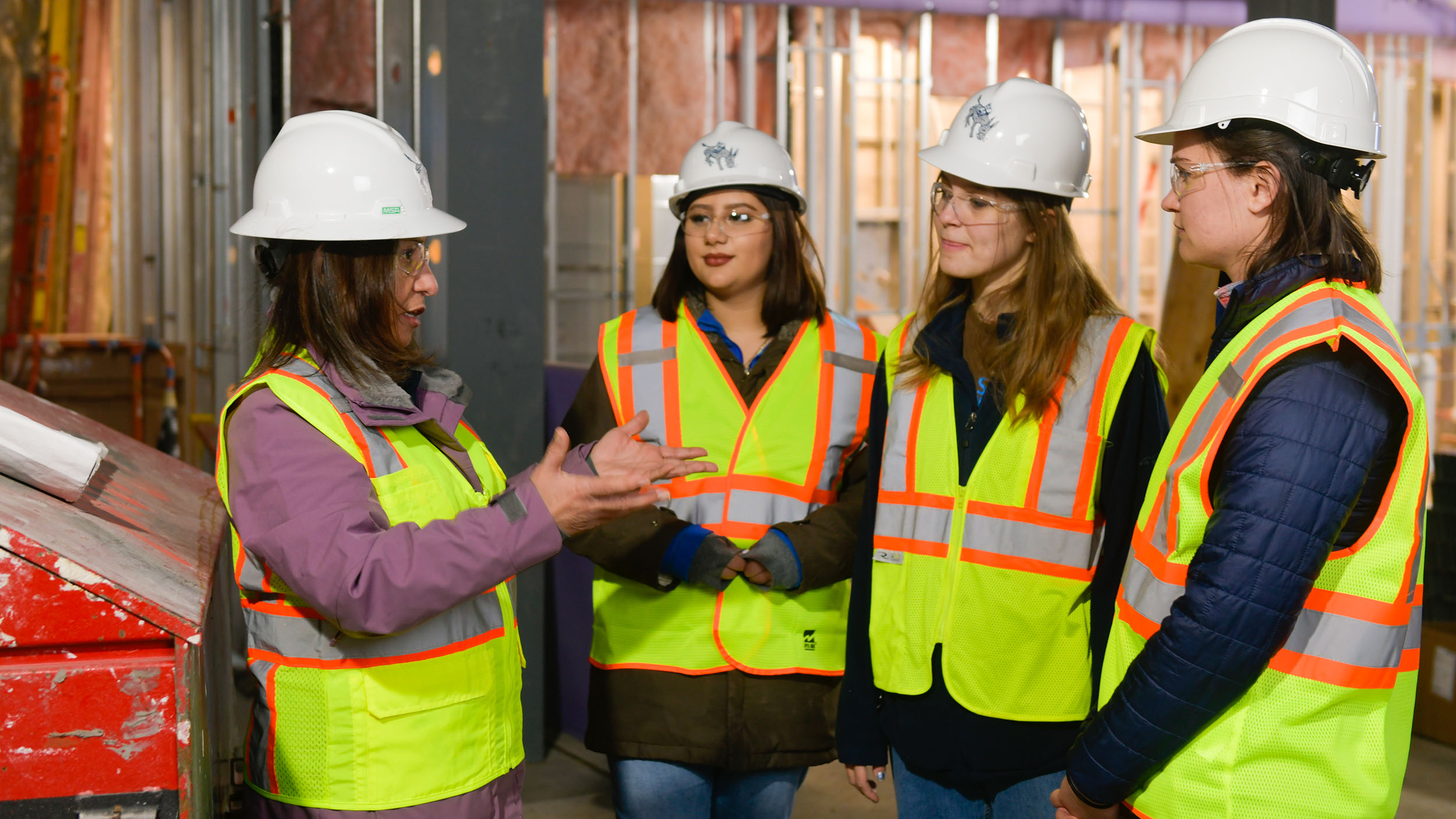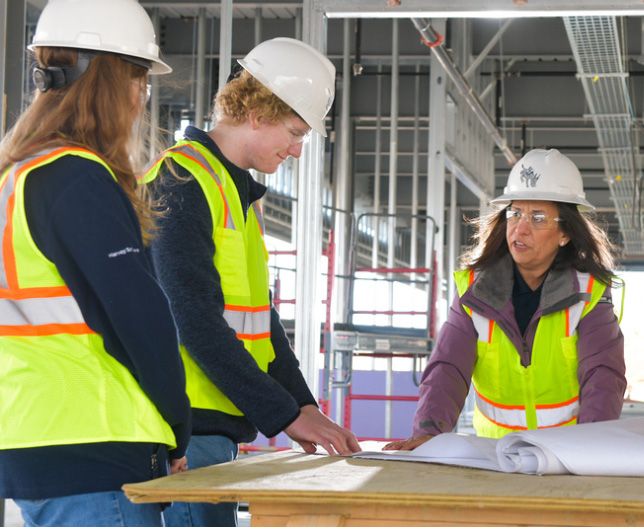Construction Engineering
Bachelor’s Degree
Build Your Future Today
The Bachelor of Science in Construction Engineering program at Colorado School of Mines expands students’ knowledge to prepare graduates for design, oversight, management, inspection, and planning career roles in support of the construction sector. Based on a rigorous foundation in basic sciences, math, engineering sciences, design principles, and civil engineering topics, students will learn the fundamental and practical skills. With this foundation, we empower our students to apply engineering skills, sustainable practices, and management principles into the built environment.
Upon graduation, students will be prepared to translate design concepts into the built environment in a wide variety of sectors, from infrastructure to commercial and residential construction to fill a myriad of job opportunities available. The undergraduate construction engineering curriculum includes a variety of essential topics and skills that are vital for the booming construction industry, including:
- Scheduling
- Estimating
- Project economics
- Cost control
- Communication
- Project administration


Experiential major menus
Explore the extra-curricular activities that complement your degree.
Construction Engineering at a glance

Opened enrollment in Fall 2023

Three new classes Spring 2024

Welcoming two new professors, Dr. Yangming Shi and Karen Gupta, P.E.

Opportunity to work with industry professionals
Desired Student Outcomes
- An ability to apply knowledge of mathematics, science, and engineering
- An ability to design and conduct experiments, as well as to analyze and interpret data
- An ability to design a system, component, or process to meet desired needs within realistic constraints such as economic, environmental, social, political, ethical, health and safety, manufacturability, and sustainability
- An ability to function on multidisciplinary teams; (e) an ability to identify, formulate, and solve engineering problems
- An understanding of professional and ethical responsibility
- An ability to communicate effectively; (h) the broad education necessary to understand the impact of engineering solutions in a global, economic, environmental and societal context
- A recognition of the need for, and an ability to engage in life-long learning
- A knowledge of contemporary issues
- An ability to use the techniques, skills, and modern engineering tools necessary for engineering practice
- Relevant tools in construction practice to plan, design, monitor, inspect and manage construction operations
Take a look at our NEW CORE- ConE Flowchart 2023-2024 to see the path toward completing your construction engineering degree.
Additionally, please visit our curriculum overview to learn more about the four-year overview for this degree.
Possible Career Areas
- Construction inspection / oversight
- Construction operations design
- Construction planning
- Construction management
Typical work for construction engineers
- upfront planning to ensure the proper budget, schedules, materials, labor resources, and contracts will be in place at the right time
- design of temporary structures that can support construction operations required in elevated or multistory construction or in deep excavations
- construction project management to manage budgets, site operations, and trade or project schedules
- identification of field conditions, adjustments to the project schedule, project oversight, safety, cost control, phasing operation execution, and communication with clients and subcontractors
- oversight of construction activities for worker safety, code compliance, contract adherence, and material controls

Faculty Spotlight
Karen Gupta, P.E.
Karen Gupta, P.E. is a Professor of Practice in the Department of Civil and Environmental Engineering at the Colorado School of Mines. She’s spearheading the new Construction Engineering Degree program and is pursuing her PhD in Civil Engineering from Colorado State University with a research focus in sustainable construction methods.
Karen is a licensed Professional Engineer in Colorado and Illinois with more than 15 years of construction industry experience and has specialized in projects involving complicated logistics and sustainable construction. Her past clients include hospitals, oil companies, technology companies, and public private partnerships and she’s worked in roles as an owner’s representative, general contractor, and as a self-employed consultant from coast to coast in the US.
Making Mines more affordable
Mines’ financial assistance program awards more than $60 million per year, and over 82 percent of the student body receives some form of financial aid.


Why study construction engineering at Mines?
f you’re looking for a program that combines both industry expertise and a theoretical underpinning to construction engineering, then you’ve come to the right place. In the construction engineering program at Mines, we’re not just builders. We’re solvers, rescuers, evaluators of constructability and designers.
Why do so many students choose Mines?
- Courses designed by industry professionals who understand industry needs
- Hands-on learning experiences and research
- Sustainable approach to construction design and engineering
- Pairing industry needs with technological expertise
- Join a unique and valued student body

Career Outcomes
Our curriculum prepares students to translate infrastructure and building designs into practice by engaging in coordination of project design, systems design, design of temporary structures, planning, logistics, scheduling, project management, and more. These vital topics are applicable to all construction projects in transportation infrastructure, buildings, water, power and energy sectors.
With a construction engineering degree, you’ll have the experience and knowledge to pursue a variety of career fields, including:
- Construction engineer
- Project engineer
- Site engineer
- Estimator
- Project manager
- Project superintendent

Karen Gupta, P.E.
Mines’ Construction Engineering graduates will be equipped with the vital tools needed to make significant contributions to the future of construction and have industry support and collaboration opportunities. The curriculum provides skills to analyze, communicate, plan, and monitor all aspects of the construction process. This new degree program was crafted through a lens of industry experience and built on Mines’ foundation in innovative teaching and sustainability.